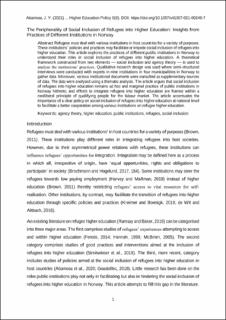The Peripherality of Social Inclusion of Refugees into Higher Education: Insights from Practices of Different Institutions in Norway
Journal article, Peer reviewed
Accepted version
Permanent lenke
https://hdl.handle.net/11250/2770671Utgivelsesdato
2021Metadata
Vis full innførselSamlinger
- Department of Education [298]
- Registrations from Cristin [9766]
Sammendrag
Refugees must deal with various institutions in host countries for a variety of purposes. These institutions’ policies and practices may facilitate or impede social inclusion of refugees into higher education. This article explores the practices of different public institutions in Norway to understand their roles in social inclusion of refugees into higher education. A theoretical framework constructed from two elements—social inclusion and agency theory—is used to analyse the institutions’ practices. Qualitative research design was used where semi-structured interviews were conducted with experts in nine institutions in four municipalities in Norway to gather data. Moreover, various institutional documents were consulted as supplementary sources of data. The data were analysed using a thematic analysis. The article argues that social inclusion of refugees into higher education remains ad hoc and marginal practice of public institutions in Norway hitherto, and efforts to integrate refugees into higher education are framed within a neoliberal principle of qualifying people for the labour market. The article accentuates the importance of a clear policy on social inclusion of refugees into higher education at national level to facilitate a better cooperation among various institutions on refugee higher education.
